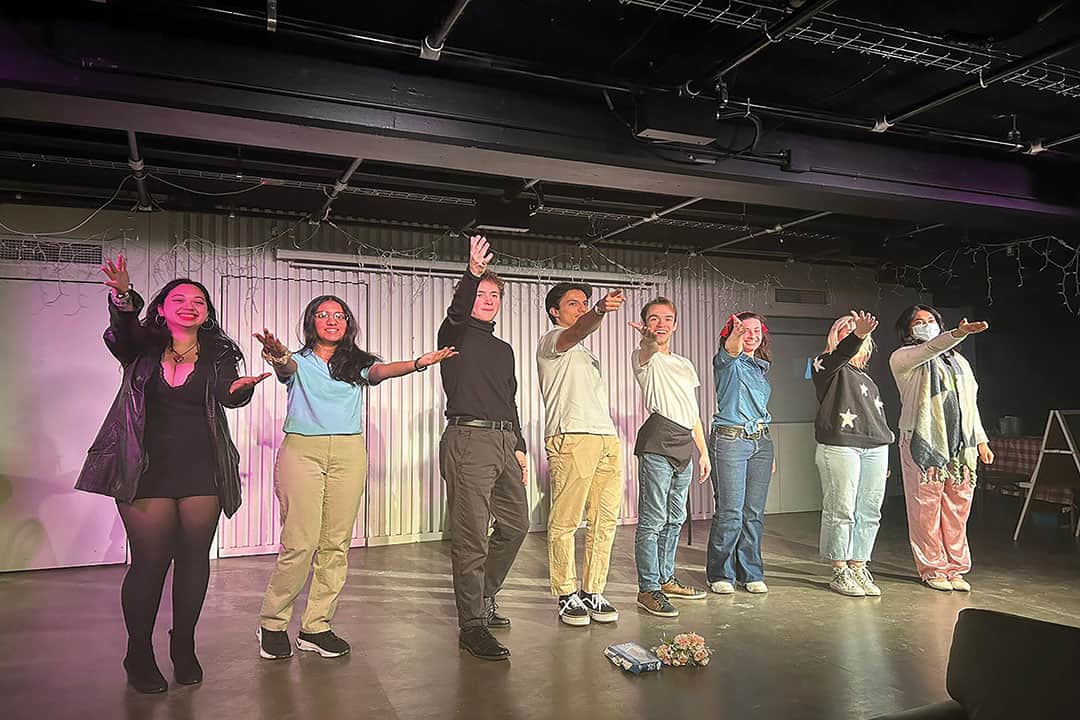On January 28, audience members gathered in the Cat’s Eye to watch the UC Follies’ production of Checking up on Mrs. Vernon. This performance was an original play written by Jasmine Ryu Won Kang, a first-year medical student in the MD/PhD program at U of T, and co-directed by Kang and Anna-Maria Maleshev, who graduated from U of T in 2021 with a BA in drama and English.
Telling the story
The play centres around an older woman named Janine Vernon (Mashreka Mahmood), who, following the death of her husband, makes a brave effort to carry on with each new day but has become dependent on alcohol and seems unable to escape the crushing weight of solitude. The few people remaining in her life include a couple of waiters at the local café, a luxury cruise telemarketer, and a grandniece. As they all attempt to comfort or redirect the older woman, they must also navigate the guilt they feel during moments in which they fail to do so.
The set design for the play, done by Abbey Kowalski, was minimal, with lightweight tables and chairs that could be swapped out easily during transitional moments. Greater emphasis was placed on lighting, also designed by Kowlaski, and dialogue — both of which took on a modernist feel.
The lighting choices reflected the wide range of emotion communicated by the actors: red for angst, pink for romance, purple and blue for sorrow, and so on. Similarly, the dialogue was fairly straightforward, delivered meaningfully and authentically for the most part, maximizing the actors’ connection with a modern audience.
The connection went beyond words as well: during moments throughout the play, the actors would either lean forward on the edge of the stage or stare at some point just past the audience’s heads, so that some of us even felt compelled to turn around and stare as well.
An interview with the playwright
The Varsity sat down with Jasmine Ryu Won Kang to discuss the process of writing her play.
The play, Kang explained, is based on a short story by Ernest Hemingway called “A Clean, Well-Lighted Place.” In the short story, an older man — much like Mrs. Vernon — frequently stops by one particular café for drinks, much to the curiosity of the younger waiter there, “who isn’t able to grasp the loneliness and sort of the existential emptiness that this old man is experiencing.”
Kang chose to maintain the character of the young waiter in her play but expanded on the dynamics of Hemingway’s short story so that Mrs. Vernon was not the only one whose life had taken a dark turn. Her grandniece Clarice (Anya Ivantchenko), for example, spent the better part of the play doubting her self-worth and dealing with a negligent boyfriend. She confided in Mrs. Vernon about these issues, and it became clear that the role of a compassionate listener was something to be shared.
When asked what inspired her to write a story about an older woman despite being in her 20s, Kang said it came from her personal relationships: “I’ve been around a lot of people who are nearing that age where things in life that mattered to them a lot in the past are sort of starting to crumble away, and the relationships that they built are not necessarily holding up.”
She continued, pointing out that “especially [in] Canada, [with] such a rapidly growing elderly demographic, it’s important to talk about these stories, and to explore… what it means for someone to age, and what barriers that people who are older might face when they’re trying to reach out to someone, when they’re trying to connect with others.”
Society, Kang thinks, might be designed for “young people to flourish, and to… meet people all the time and have all these short-term, fast connections.” However, she wonders, “how many genuine, multi-decade relationships do we have in the end?” According to Kang, these are the relationships that keep us going and ultimately matter the most, presumably because they are formed around the people who have agreed to help carry the weight of our burdens.
Her words remind me of a line by Clarice’s therapist, Dr. Moore (Noah Sokoloff), near the end of the play. He says, “Instead of holding us captive, chains serve a different, essential purpose. They tie us together and remind us of our interconnectedness.” Perhaps the burdens we carry, when we share the weight of them with others, can be a means to identify those who care for us the most in this life.
Editors note: An earlier version of this article stated that Jasmine Ryu Won Kang was a grad student, when she is actually a medical student. The earlier version also mispelled “Clarice.” The spelling of the set designer’s name has also been corrected from Abbey Kowlaski to Abbey Kowalski.



No comments to display.